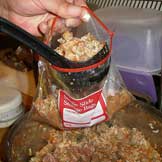
Do you cook for your dog? If so, how confident are you that the recipe(s) you use provide complete and balanced nutrition? The results of a study evaluating two hundred recipes obtained from 34 sources (veterinary textbooks, pet care books for owners, and websites) were published in the June 1, 2013 issue of the Journal of the American Veterinary Medical Association (JAVMA).
The results were disturbing:
Most (184 [92%]) recipes contained vague or incomplete instructions that necessitated 1 or more assumptions for the ingredients, method of preparation, or supplement-type products.
Only 3 recipes provided all essential nutrients in concentrations meeting or exceeding the NRC [National Research Council] RA [recommended allowances], and another 2 recipes provided all essential nutrients in concentrations meeting or exceeding the NRC MR [minimum requirements]… Nine recipes provided all essential nutrients in concentrations exceeding the AAFCO [Association of American Feed Control Officials] nutrient profile minimums for adult dogs; 4 of these also met or exceeded the NRC RA or NRC MR… Overall, most (190/200 [95%]) recipes resulted in at least 1 essential nutrient at concentrations that did not meet NRC or AAFCO guidelines, and many (167 [83.5%]) recipes had multiple deficiencies.
Some deficiencies were so severe that nutrient concentrations did not reach 50% of the NRC RA; these included diets deficient in vitamin D (97/102 [95.1%]), zinc (76/138 [55.1%]), choline (56/129 [43.4%]), and vitamin E (31/79 [39.2%]). Nine recipes surpassed the safe upper limit for vitamin D, and 6 surpassed the safe upper limit for the combination of EPA plus DHA [types of omega 3 fatty acids].
You’ll hear many people who recommend home-prepared foods for dogs say that “slight” nutritional deficiencies in any one diet can be compensated for by rotating between several diets. On the surface, this claim makes sense, but the researchers took a closer look at this claim. They evaluated three recipe groups, each consisting of seven separate recipes, and found that nutritional problems would arise even if a dog ate all seven of the diets within the group.
[M]any recipes had similar deficiencies, with 14 nutrients provided at inadequate concentrations in at least 50 recipes. Thus, even the use of a strategy for rotation among several recipes from multiple sources would be unlikely to provide a balanced diet.
Recipes that were written by veterinarians had a lower number of deficiencies in comparison to those written by non-veterinarians. However, most of the recipes written by veterinarians were still deficient in at least one nutrient. The researchers only looked at four recipes written by board-certified veterinary nutritionists, but all four of these “were within the AAFCO-recommended ranges for an adult canine maintenance diet.” Therefore, owners who want to ensure that their dog’s home-prepared food is nutritionally complete and balanced should seek out the services of one of these specialists.
Your local veterinary college, Petdiets.com, and BalanceIt.com all provide access to board-certified veterinary nutritionists.

Dr. Jennifer Coates
Reference
Evaluation of recipes of home-prepared maintenance diets for dogs. Stockman J, Fascetti AJ, Kass PH, Larsen JA. J Am Vet Med Assoc. 2013 Jun 1;242(11):1500-5.
Image: Thinkstock








